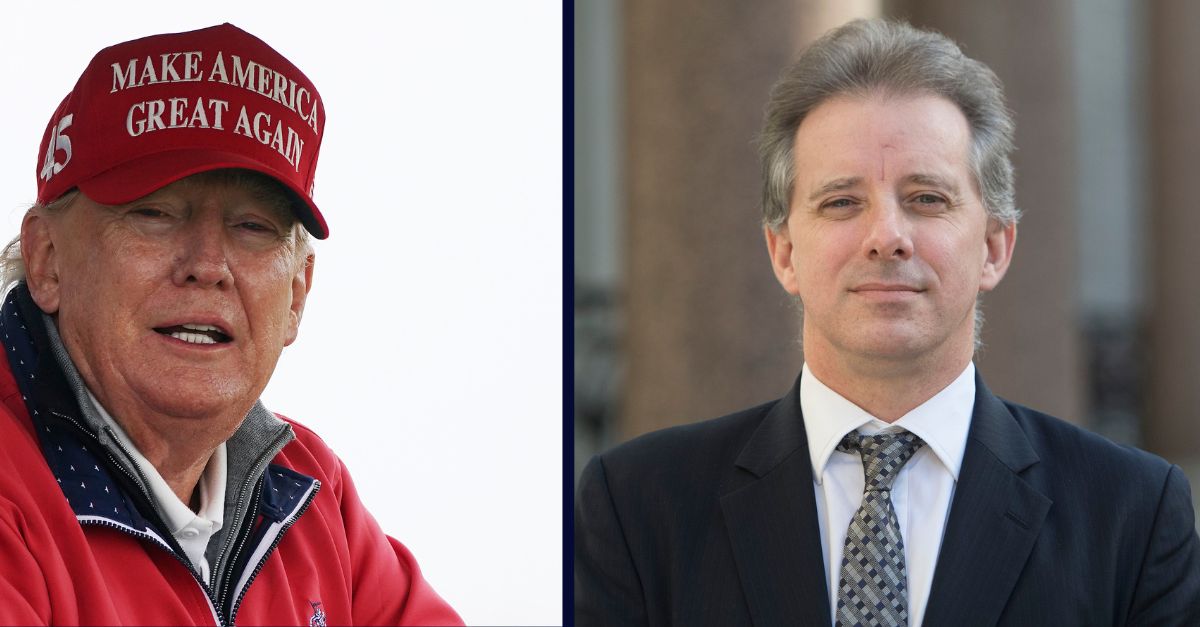
Left: File photo dated 04/05/23 of former U.S. President Donald Trump; Right: File photo dated 7/3/2017 of Christopher Steele, the former MI6 officer who wrote a report on Donald Trump’s alleged links to Russia. (Press Association via AP Images)
A judge in London on Thursday ordered former President Donald Trump to pay nearly $400,000 to a private intelligence company owned by former British spy Christopher Steele over an abortive data protection lawsuit dismissed by the same judge earlier this year.
On Feb. 1, Judge Karen Steyn ruled the 45th president “has no reasonable grounds for bringing a claim for compensation or damages” and entered judgment in the company’s favor.
On Thursday, Steyn ordered Trump to pay initial legal fees of at least 300,000 pounds sterling — roughly equivalent to just north of $384,000, according to the latest exchange rates at the time of publication. But the ex-president’s final costs could easily double.
In an order obtained by the London-based PA News Agency, the judge ordered Trump to pay the cost “of the entire claim.”
Steele’s company says the full cost of defending against the lawsuit has run over 600,000 pounds sterling, according to Steyn. But, the judge ruled, she was initially ordering Trump to pay only half of that estimate pending a final determination by a specialist judge.
The case brought by Trump against Orbis Business Intelligence was filed in the High Court of Justice King’s Bench Division in October 2022. The lawsuit was subsequently amended and an additional claim was added. Orbis then moved for summary judgment.
The basis for the failed lawsuit was the lurid allegations contained in the discredited Steele dossier. But in her order dismissing the lawsuit, Steyn decided against discussing the merits and, instead ruling on procedural grounds.
The initial claims were based on two U.K. data protection laws passed in 2018. Trump’s legal team essentially moved to amend the lawsuit and only sue Orbis in February 2023 — and to include a claim based on a 1998 data protection law.
In the end, the judge determined Trump’s lawsuit contained no valid claims under the 2018 laws — because those two laws “came into force” well after the completion of the complained-of memos in the 2016 dossier. And, Steyn also found, the six-year statute of limitations for the claim based on the 1998 law had passed by the time Trump’s English barrister Hugh Tomlinson thought to include that later claim.
Trump’s amended lawsuit was based on two separate and sexually charged memos in the dossier — which contained 17 memos in total.
Memo 80 referred to the infamous “pee tape” in which Steele alleged Russian intelligence has video of Trump engaging in “perverted sexual behavior” — namely “golden showers” with sex workers in Moscow. The memo also claims Trump requested and watched the women urinate on a bed once slept on by Barack and Michelle Obama in order to somehow spite the couple. All this, the dossier claimed, provided the Russian Federation with considerable blackmail material.
Memo 113 contains claims that Trump paid bribes to Russian officials in the course of furthering his business empire. Additionally, the memo claims Trump took part in “sex parties” in St. Petersburg and then tried to coerce or bribe all the witnesses into silence.
None of those claims have ever been substantiated.
Steyn in her dismissal, makes clear to point out that her judgment does not address the alleged “personal and reputational damage and distress” cited by Trump in his original complaint.
“It is important to emphasise that the Defendant has not contended that the Claimant would have no real prospect of establishing at trial that the personal data complained of is inaccurate,” the judgment reads. “The Claimant’s evidence is that the allegations are ‘wholly untrue.’ I have not considered, or made any determination, as to the accuracy or inaccuracy of the Memoranda.”
Have a tip we should know? [email protected]

